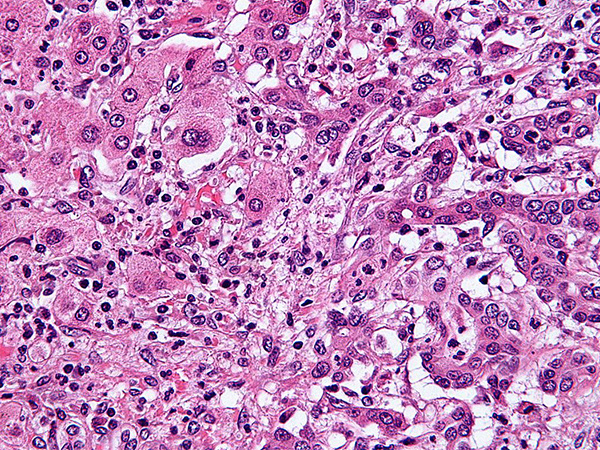Targeting Bile Duct Cancer
The first molecularly targeted therapeutic for use in the treatment of bile duct cancer has been approved by the FDA.

The U.S. Food and Drug Administration (FDA) has approved a new molecularly targeted therapeutic called pemigatinib (Pemazyre) for treating certain patients with bile duct cancer, also known as cholangiocarcinoma.
Specifically, pemigatinib is intended for treating patients who have advanced or metastatic cholangiocarcinoma that tests positive for specific FGFR2 genetic alterations and that has progressed during or after at least one other treatment.
Cholangiocarcinoma is a type of cancer that arises in cells that form the bile ducts, which are small tubes that connect the liver and gallbladder to the small intestine. There are two forms of the disease, named depending on whether the bile ducts in which the cancer begins are inside (intrahepatic cholangiocarcinoma) or outside (extrahepatic cholangiocarcinoma) the liver.
The disease can be challenging to diagnose accurately, making it hard to determine exactly how many cases occur each year in the United States. Despite the challenges, researchers have learned that the incidence of cholangiocarcinoma has been rising in the United States in recent years. This is largely as a result of an increase in the incidence of intrahepatic cholangiocarcinoma, which is counted together with liver cancer by the National Cancer Institute.
Most patients have advanced cholangiocarcinoma at the time they are first diagnosed, and the prognosis for these patients is poor. One study showed that patients with locally advanced or metastatic cholangiocarcinoma who are treated with chemotherapy, which is one of the most common approaches to treating these patients, have a median survival of less than one year.
Numerous genomic studies, including one published in the AACR journal Clinical Cancer Research, has led researchers to estimate that from 10 percent to 20 percent of patients with intrahepatic cholangiocarcinoma have an alteration in the FGFR2 gene. These data suggest that targeting FGFR2 might provide a new approach to treating cholangiocarcinoma, in particular intrahepatic cholangiocarcinoma.
Pemigatinib is a new therapeutic that targets FGFR2. Its approval by the FDA was based on results from the phase II FIGHT-202 clinical trial, which were published in the Lancet Oncology. The data showed that treatment with pemigatinib led to tumor shrinkage for 38 of the 107 patients (36 percent) enrolled in the trial who had locally advanced or metastatic cholangiocarcinoma that tested positive for FGFR2. Three of these 38 patients had complete tumor shrinkage, and the rest had partial tumor shrinkage. Tumor shrinkage lasted six months or longer for 24 patients and 12 months or longer for seven patients.
Pemigatinib is being tested in several other clinical trials as a treatment for other types of cancer that are known to often be driven by FGFR genetic alterations, including bladder cancer. The only other FGFR-targeted therapeutic approved by the FDA, erdafitinib (Balversa), was approved in April 2019 for treating certain patients who have bladder cancer that tests positive for FGFR2 or FGFR3 genetic alterations.
The FDA approval was rendered on April 17, 2020.
